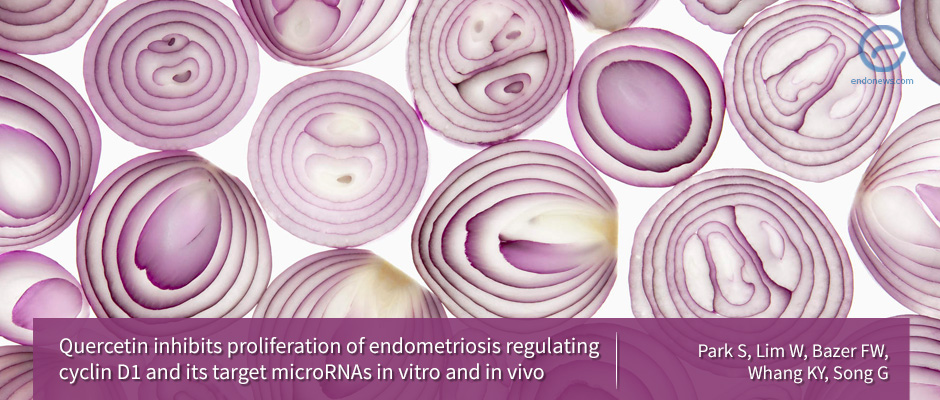Anti-proliferative and anti-inflammatory effects of "Quercetin" on endometriosis
Dec 17, 2018
Quercetin inhibits the proliferation of endometriosis by regulating cyclin D1 and its target microRNAs
Key Points
Highlight:
- Quercetin may potentially act as a natural therapeutic to reduce and treat human endometriosis.
Background:
- Quercetin is a major dietary flavonol found in diverse fruits and vegetables such as onions, cauliflower, apple skin, lettuce, and chili peppers.
- Reported as a functional compound, Quercetin shows a wide range of biological effects (antioxidant, anti-inflammatory, antiangiogenic properties in obesity, diabetes, cardiovascular diseases, and various cancers).
- Specifically, Quercetin enhances cell death and inhibits cell proliferation of hormone-related cancers including breast cancer, ovarian cancer, and cervical cancer.
- The function of quercetin in human endometriosis is not examined in depth.
Key points:
- In this study, Dr. Song group from Korea investigated if Quercetin regulates cell proliferation and induces the apoptosis of human endometriosis.
- Quercetin significantly decreased endometriosis cell proliferation, also regulated depolarization of mitochondrial membrane-reactive oxygen species production and lead to cell apoptosis.
- The phosphorylation of MAPK and PI3K/AKT signaling pathway which play an important role in cell proliferation was attenuated by Quercetin.
- Quercetin also decreased the auto-planted endometriosis lesion size in C57BL/6 mice.
- The mRNA and protein expression of Cyclin D1, a cell phase regulatory gene, were diminished in endometriotic lesions of quercetin-administered mice and human endometriosis cells.
Conclusions:
- The Dr. Song group findings indicate that Quercetin exhibits a high potential as a therapeutic agent for endometriosis.
- Further preclinical studies on a large scale are necessary before the clinical trial on endometriosis patients.
Lay Summary
Quercetin is a major flavonol that is mainly derived from capers and involves a daily consumption of approximately 25–50 mg through various vegetables.
In recent studies, Quercetin is reported as a functional compound in obesity, diabetes and cardiovascular diseases. This compound also shows a wide range of apoptotic effects on cancer cells. Specifically, Quercetin enhances cell death and inhibits cell proliferation of hormone-related cancers including breast cancer, ovarian cancer, and cervical cancer. However, the curative function of quercetin in human endometriosis is not examined in depth. Here, Dr. Song group from South Korea investigated if quercetin regulates cell proliferation and induces the apoptosis of human endometriosis.
Quercetin significantly decreased endometriosis cell proliferation and regulates cell stage in human endometriosis cell lines in vitro. Subsequently, Dr. Song group investigated the apoptotic effects of quercetin on human endometriosis cells. They found that Quercetin regulates mitochondrial membrane and generates reactive oxygen species production which leads to cell apoptosis.
Next, cellular signaling proteins related to cellular proliferation were examined. MAPK and PI3K/AKT, the cell signaling pathway that has an important role in cell proliferation was attenuated by Quercetin. To verify the antiproliferative and apoptotic effects of Quercetin in vivo, mice with auto-planted endometriosis were used: after quercetin treatment for a month, the size of the endometriosis lesion was significantly decreased compared to the control group.
In summary, the Dr. Song group findings indicate that Quercetin exhibits a high potential as a therapeutic agent for endometriosis. However, "further preclinical studies on a large scale are necessary before the clinical trial on endometriosis patients" the group added.
Research Source: https://www.ncbi.nlm.nih.gov/pubmed/30359864
Quercetin Endometriosis Anti-proliferation Anti-inflammatory MicroRNAs Pregnancy inflammation

